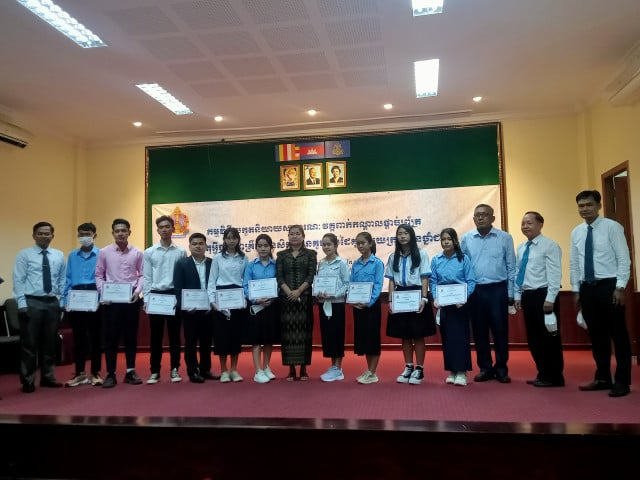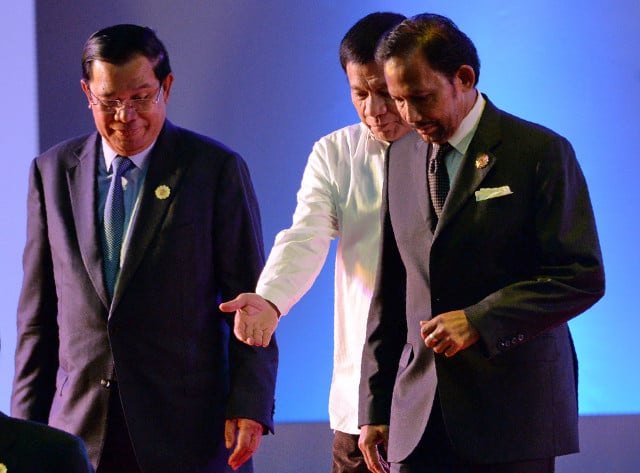Young Public Speakers Debate Tobacco Harm

- By Sam Sopich
- July 14, 2022 6:00 PM
PHNOM PENH – Five students and young people have been selected as finalists in the Public Speaking Competition on “Why should educational institutions not partner with tobacco companies?”
The finalists, who come from across the country, will take the platform to raise awareness of the effects of smoking and tobacco. They will go head-to-head on July 21 in Phnom Penh.
The competition is run by the Education Ministry and Cambodia Movement for Health, a local non-government organization.
Ten speakers were selected from 300 candidates to take part in the semi-final on July 13
During the semi-final, candidates said tobacco companies intend to attract customers through advertising, creating a new generation of products that appeal to young people. Companies planned advocacy activities and established public relations programs in educational and other institutions to hide the harmful impact of tobacco.
Hak Thida, 16, a student at Samdech Ov-Samdech Mey High School in Ratanakiri province, is one of the finalists. She said she was prompted to join the competition as she saw students smoking cigarettes and vaping in a disorderedly way in her province.
By taking part in the competition, she said she can raise awareness about the harm of tobacco, especially to students and young people, as tobacco not only affects lives but also the economy. It seriously affects the health and education of students, who are the potential human resources of the country.
“Tobacco is very popular and hits the market,” Thida said. “The promotion of the tobacco company, such as creating attractive strategies by using banner advertising or rewards have lured some young people to try using tobacco.
“Promotion of smoker chic and exchanging cigarette packets for money are also popular.”
Education institutions should not cooperate with tobacco companies even if they give sponsorships, charities, internships and promotions in schools. Students pursue knowledge to be future leaders. If smoking controls them, they will be a burden on the nation.
Another finalist, Ly Rathana, an eighth-year medical student at the University of Health Sciences, said the program was good because it let students raise the issues of prevention efforts and impact of tobacco.
During his speech, Rathana said cigarettes damaged the health of smokers, causing two major problems: mental illness and physical illness. Passive smokers, especially children and women, also suffered serious health effects.
“Women who passively inhale the smoke are more vulnerable to miscarriage, weight loss, anemia, stunted growth and serious respiratory diseases,” he said.
Rathana said tobacco products affect the environment and the national economy. Tobacco production emits more than 84 million tonnes of greenhouse gases into the atmosphere every year and costs Cambodia $649 million a year.
The major concern is that advertising companies exaggerate e-cigarettes as a smoking cessation tool that does not contain drugs or menthol, has no bad taste and does not affect health, which makes young people want to try them.
Rathana suggested that the Education Ministry identify and disseminate widely the prohibition of the use, sale and promotion of such products around and on school campuses.
Education and dissemination of knowledge on the dangers of tobacco products were crucial, he said, and educational institutions should not partner with the tobacco industry for any purpose.
“We, the Cambodian youth, must stay away from this legal drug,” he said.
The public speaking competition aims to promote awareness of the impact of partnerships between educational institutions and the tobacco industry.
The program is also to spread the message of ministry guidelines on banning the use of advertisements, the sale of tobacco products and cooperation with the tobacco industry. The guidelines also encourage opportunities for young people to express themselves in public.
The first-place winner will receive 1 million riel or $250 and a computer, the second-place winner will receive 800,000 riel or $200 and a computer, while the third-place winner will receive 600,000 riel or $150 and a mobile phone.
The 4th and 5th place winners will receive an incentive prize of 400,000 riel or $100.















